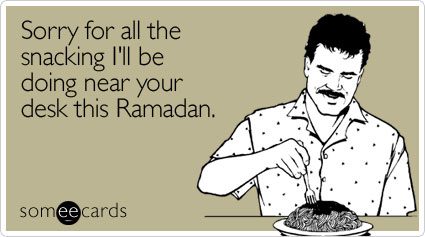The entire Islamsphere is focused upon the imminent arrival of Ramadan – I follow the Fatimid calendar, so my first fast will be Thursday, as will most moonsighters; those muslims following the the FCNA calculation will begin on Friday.
This pre-Ramadan period is always marked by a tension in each muslim’s mind, between spiritual idealism and worldly materialism. I described this tension as “trembling” with anticipation (and quoted Yoda!). It really is a mixture of fear and anticipation, so closely entwined that we don’t really know what we are feeling.
Most muslim blogs right now are full of advice on preparing for Ramadan in the spiritual sense, but personally I think that Ramadan itself facilitates that reflection. Right now, embedded in the world as we are, it is overwhelming to be asked to suddenly elevate our spiritual awareness before Ramadan has even begun. My strategy is to prepare physically – by planning what I will eat for the suhoor, making plans for iftar and daily menu planning, focusing on logistical changes to our daily routines necessitated by the fast. After all, we cannot escape the paradox of time during Ramadan. This way I can hit the ground running and be able to focus more fully on ibadat and spiritual awareness when Ramadan actually arrives.
The single biggest thing a muslim should focus on during Ramadan is our nafs, or our spiritual state. In reality, though, the biggest thing we obsess over is the fasting; it dominates our thinking and our actions, at least for the first week or so until we acclimate. We obsess over what we are going to eat, (especially athletes), how long the fasts are, and how we are going to end them. This begins long before Ramadan begins – even the summer solstice is significant because of its implication for our fasting hours!
But after that transition – we do enter that higher state of mind, and this is only possible because of the discipline of the fast. We elevate our minds only after we have exerted control over our bodies. Only then does the tragedy of Ramadan reveal itself – it has the longest days, but is the shortest month. The truth is that Ramadan is an ephemeral gift that we don’t fully appreciate until it’s already underway, and then we must scramble to try and make the most of what remains.
I’ve blogged about Ramadan every year for many years now, and this year I will try to continue that tradition. I ask for all your remembrance in your precious duas (prayers) and wish you a bountiful Ramadan this year, as every year, inshallah. Let’s get ready together!
Related: Here is a primer on the moonsighting vs calendar debate that happens every year, along with my contribution to that debate in defense of using calculations to determine when Ramadan begins.


